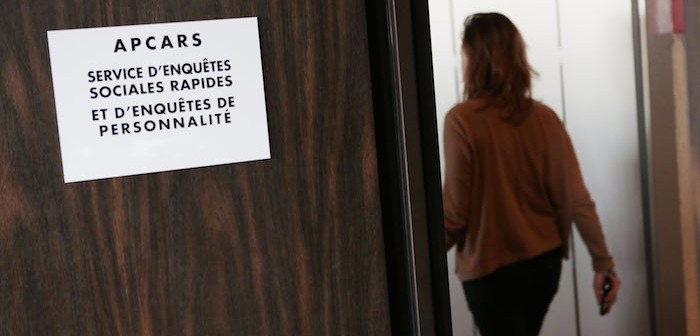Penal justice must benefit from all elements of comprehension to render a fair decision. In this domain, APCARS contributes to a more enlightened and thus more efficient justice.
In 1980, our association was a precursor in France in providing information to explain the past history of the suspected person.
This entails retracing his recent past, his social, professional, and family situation so that in the case of a guilty verdict, justice can pronounce an adapted sentence. This could take into account such conditions as a handicap or an addiction; sufficient resources for compensating a victim or, on the contrary, a significant debt; a stable living situation or a long period of vagrancy, etc.
The quick social investigation, initially included in the procedures of flagrancy is now solicited for plea bargain hearings. It consists of three parts. The first one is the gathering of information from the detainee in the police station. The investigator then verifies the elements and completes them by phoning principally the detainee’s personal and professional contacts. Finally, the investigator edits their report using a standard form.
APCARS carries out nearly one-third (16,000) of the quick social investigations in France.
In the case of more serious offenses and crimes, the investigating judge can solicit a personality investigation. As opposed to the quick social investigation that takes one hour and thirty minutes, these investigations require about twenty hours of work. In the past, we have carried out investigations in numerous well-known cases in the media, such as the Gang of the Barbarians, the Ponant Piracy, the Tarnac Nine cases, or, more recently, in the exceptional case of Genocide in Rwanda.
Monsieur H. Stephan, President of the Assize Court (Paris Appeals Court) concerning our personality investigations and our oral testimony in the Assize Court
“The personality investigation is an essential element of the procedure that evokes a person’s life and environment in a complete manner. The oral testimony of the investigator before the court, reporting on their investigations, is a strong moment in the trial. When the investigation concerns a victim, this can sometimes be the sole element of information available to understand their life. The training of the APCARS investigators and the guidelines used in drawing up their reports and delivering their statements thus allow them to reconstitute their quality work during the trial, and this is fully appreciated by the judges and the members of the jury.”
Monsieur O. Leurent, President of the Assize Court (Paris Appeals Court) concerning our personality investigations and our oral testimony in the Assize Court
“With their higher degrees in Social Sciences and very solid professional experience in the social domain, the APCARS investigators put the biography of the accused party, and in some cases that of the victim, in perspective, thus enlightening the Assize Court as to the principal events that contributed to the structuration of their personality, by confronting the declarations of the person of interest with those of their close family members and checking the conformity of the former with reality.
These personality investigations clearly contribute as such to the manifestation of the truth.”


